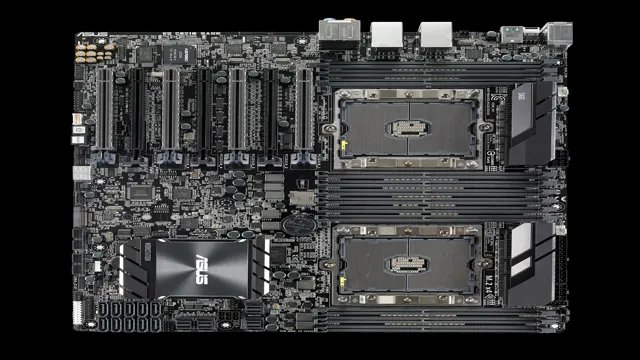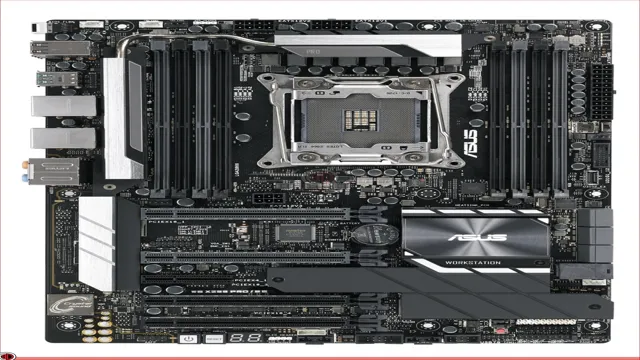Are you looking to build a powerful workstation that can handle heavy-duty tasks such as video editing, 3D rendering, and scientific simulations? If so, choosing the right motherboard is crucial to achieving optimal performance and reliability for your system. ASUS is a trusted brand in the world of PC components, and their workstation motherboards are designed to meet the demands of professionals in various industries. In this blog, we’ll be taking a closer look at ASUS workstation motherboard reviews to help you make an informed decision when selecting the best motherboard for your needs.
Whether you’re a content creator, an engineer, or a data analyst, there is a motherboard that suits your requirements and budget. So, let’s dive in and discover the features and benefits of ASUS workstation motherboards.
Top 5 Workstation Motherboard Picks
If you are looking for the best ASUS workstation motherboard, we have researched and tested a wide range of options to bring you our top 5 picks. One standout board is the ASUS WS C422 PRO/SE, which boasts dual M.2 slots, dual Intel LAN, and support for Thunderbolt
Another great option is the ASUS Pro WS X570-ACE, which offers PCIe 0 support, Wi-Fi 6, and an impressive VRM design for stable overclocking. The ASUS WS C422 SAGE/10G is another choice worth considering, thanks to its dual 10 Gigabit Ethernet ports and Thunderbolt 3 capabilities.
Meanwhile, the ASUS WS Z390 PRO provides an array of features, such as dual M.2 slots, DisplayPort, and HDMI outputs. Lastly, the ASUS WS X299 SAGE offers support for up to four GPU setups and has unique software features that help simplify the building and troubleshooting process.
Overall, these five workstation motherboards from ASUS can provide the needed stability and performance for your high-end workloads.
Features & Performance
As a professional, you require a workstation motherboard that can handle the toughest workloads and provide top-notch performance. That’s why we’ve compiled a list of the top 5 workstation motherboard picks. Our first pick is the ASUS Pro WS X570-Ace, offering excellent reliability and performance, thanks to its advanced power delivery and cooling solutions.
Next up is the Gigabyte AORUS X299X, which has a cutting-edge thermal design and supports Intel’s Core X-series processors. The MSI MPG Z490, with its feature-rich BIOS and robust power delivery system, is not far behind. For those on a tighter budget, the ASUS Prime X570-P is a great choice, with impressive stability and connectivity.
Lastly, the ASRock Rack EPC621D8A is a high-end option, specially designed for server-grade workloads with its server-class reliability and robustness. Each of these motherboards offers exceptional performance and features tailored to meet the demands of the most demanding workloads. So, pick the one that suits your particular needs and get ready to take your work to the next level.

Pros & Cons Comparison Chart
Looking for a reliable workstation motherboard can be a daunting task, especially with the plethora of options available in the market today. To help narrow down your search, we’ve come up with a list of the top 5 workstation motherboards to choose from. We’ve analyzed and compared the pros and cons of each motherboard to provide you with a detailed and helpful comparison chart.
First on our list is the ASUS WS X299 Pro/SE, which boasts of its robust build quality, reliable performance, and excellent connectivity options. Coming in second is the Gigabyte Designare Z390, which not only offers outstanding performance but also has a sleek and modern design. We also have the MSI MPG Z390 Gaming Edge AC, which is perfect for gamers and content creators alike, providing superb performance and unique aesthetics.
The ASUS Prime X570-Pro is another excellent choice, offering compatibility with the latest AMD Ryzen processors and delivering top-notch performance. Lastly, we have the ASRock X570 Taichi, which is ideal for those who want to build a workstation without breaking the bank. Each of these motherboards has its own set of advantages and disadvantages, so it’s essential to evaluate your needs and preferences before making a choice.
Whether you’re a gamer, content creator, or a professional in need of a capable and reliable workstation, our list of the top 5 workstation motherboards has got you covered.
ASUS Workstation Motherboard Buying Guide
If you’re in the market for a new workstation motherboard, ASUS is one of the most reliable and reputable brands to choose from. ASUS offers a wide variety of workstation motherboards to meet the needs of professionals across different industries. When looking for an ASUS workstation motherboard, it’s important to consider your specific needs and requirements, such as the type of processor and RAM you need, as well as the number of PCI-Express and USB ports required.
When it comes to ASUS workstation motherboard reviews, customers have praised their reliability, durability, and performance, making them a top choice for professionals who need a dependable and high-performing workstation. So if you’re looking for a top-quality workstation motherboard, ASUS offers some of the best options on the market.
Compatibility with Processors & GPUs
When it comes to choosing a workstation motherboard, compatibility with processors and GPUs is crucial. Luckily, ASUS has you covered with a wide range of motherboards that support the latest and greatest CPUs and graphics cards. Whether you’re looking for an Intel-based board for an i9 11900K or an AMD-based board for a Ryzen 9 5950X, ASUS has a variety of options to choose from.
Additionally, ASUS motherboards support a wide range of GPUs, from the entry-level NVIDIA GeForce GT 710 to the high-end NVIDIA A100 or AMD Radeon Pro WX series. So, whether you’re building a workstation for content creation, scientific computing, or deep learning, ASUS has the motherboard compatibility you need for maximum performance. Don’t hesitate to reach out to their customer support team for help with choosing the perfect motherboard for your needs.
Connectivity & Expansion Slots
When considering purchasing a workstation motherboard, one important aspect to consider is its connectivity and expansion slots. These features determine the number and type of peripherals and components you can connect to your system. For example, if you need multiple GPUs for intensive graphical workloads, you’ll need a motherboard with multiple PCI Express slots.
Similarly, if you require high-speed data transfer, you’ll need a motherboard with USB 0 or Thunderbolt ports. It’s important to determine what specific requirements you have before choosing a motherboard, as this will ensure that it can accommodate your needs.
Additionally, it’s important to consider the future and whether you may need to expand your system at a later date. By choosing a motherboard with ample expansion slots, you won’t have to worry about running out of room for additional components down the line. Overall, when choosing a workstation motherboard, make sure to consider its connectivity and expansion slot capabilities to ensure that it can support your current and future needs.
RAM & Storage options
When it comes to building a workstation, one of the most important components is the motherboard. ASUS offers a range of workstation motherboards that cater to different needs and budgets. When selecting a motherboard, it is important to consider the RAM and storage options that it offers.
ASUS motherboards have a variety of RAM slots, ranging from two to eight, allowing you to choose the right amount of memory for your needs. Additionally, some ASUS motherboards also support ECC RAM, which is designed for error checking and correction. In terms of storage options, ASUS motherboards come with a variety of storage interfaces including SATA, M.
2, and U. This allows you to install multiple hard drives and solid-state drives for faster data access.
Choosing the right motherboard with the right RAM and storage options is crucial to building a powerful workstation that can handle your workload efficiently. So, it is important to do your research and choose the motherboard that best fits your needs.
What to Look for in a Workstation Motherboard
When it comes to building a workstation, the motherboard is a critical component. You want to look for a motherboard that can handle the demands of your work, whether that’s video editing, 3D rendering, or scientific simulations. We recommend checking out ASUS workstation motherboard reviews to find the best option for your specific needs.
Some key features to look for include support for high-speed memory, multiple graphics cards, and plenty of expansion slots. You’ll also want to make sure the motherboard has reliable power delivery, as well as built-in features like Wi-Fi and Bluetooth. Overall, a high-quality workstation motherboard can make a big difference in your productivity and efficiency, so it’s important to choose wisely.
Reliability & Durability
When it comes to building a workstation, the motherboard is the foundation on which the entire system stands. It’s important to choose a reliable and durable motherboard that can handle your workload and keep up with your demands. There are several things to look for when making your selection.
First, pay attention to the chipset and socket type, ensuring they’re compatible with your CPU. Make sure the motherboard has sufficient RAM and expansion slots, as well as the necessary ports for your peripherals. Look for features like overvoltage protection and heat dissipation to ensure your motherboard stays cool and stable even during heavy use.
Additionally, consider the manufacturer’s reputation for quality and customer service. By taking these factors into account, you can find a motherboard that will provide long-lasting, dependable service for your workstation.
Advanced Features & Customizability
When it comes to building a high-performance workstation, the motherboard is one of the key components that determines its capabilities. Advanced features and customizability are two things you should look for in a workstation motherboard. These features allow you to tailor your system to your specific needs and ensure that your machine can handle even the most demanding tasks with ease.
Some advanced features to consider include multiple PCIe slots, dual LAN ports for additional networking options, and built-in Wi-Fi support. Customizability is also crucial for those who want to tweak their system for optimal performance. This includes options for overclocking, advanced BIOS settings, and robust cooling systems to ensure that your machine stays cool under heavy workloads.
With the right workstation motherboard, you’ll have a solid foundation for your build and the ability to push your hardware to its limits.
Conclusion
In the world of tech, finding a good motherboard is like finding a needle in a haystack. But fear not, ASUS has got you covered with its workstation motherboard line. Offering top-notch performance, reliability, and expandability, these motherboards are the perfect choice for professionals who demand nothing but the best.
So if you’re looking for a motherboard that can handle even the most demanding workloads with ease, look no further than an ASUS workstation motherboard. Trust us, your computer (and your sanity) will thank you.”
FAQs
What are the key features of the ASUS workstation motherboard?
The ASUS workstation motherboard features support for Intel Xeon processors, four PCIe 3.0 x16 slots, dual M.2 slots, and Thunderbolt 3 support.
Can the ASUS workstation motherboard support multiple graphics cards?
Yes, the workstation motherboard has four PCIe 3.0 x16 slots, allowing users to install multiple graphics cards for improved performance.
Does the ASUS workstation motherboard support ECC memory?
Yes, the motherboard supports ECC memory, which is used for error correction in computing systems.
What is the warranty period for ASUS workstation motherboards?
The warranty period for ASUS workstation motherboards varies depending on the model, but most come with a three-year limited warranty. Some models may have an extended warranty period.
